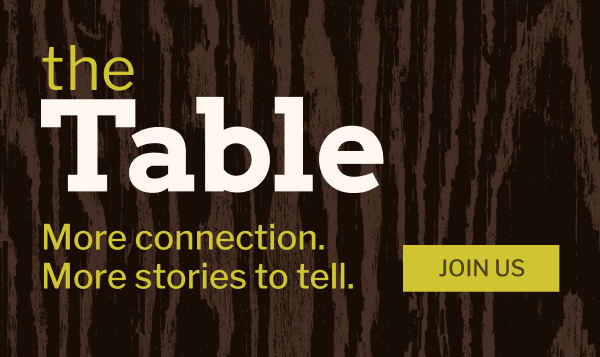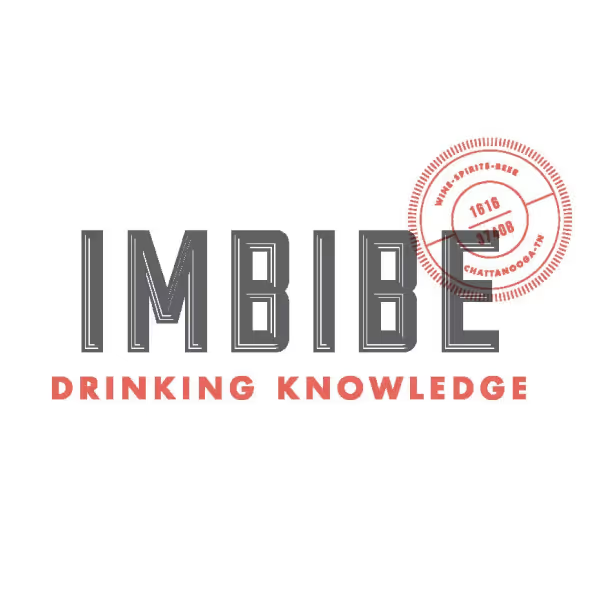
Romance, story and stars: a New Year's Eve invitation
Let the bottle find you.
Food as a verb thanks
for sponsoring this series

With a Dry January epilogue
There are two ways to enter a wine + spirits store on New Year's Eve.
You can beat a straight-line path to the first $20 bottle in reach, grab it, swipe - your card, not the bottle - and go.
The other way?
Let the bottle find you.

But how?
"Place," said Caleb Kneip, wine director at Imbibe Chattanooga. "And story.

Stories come easily to Caleb, who oversees Imbibe's wine collection and its Wine Club, the largest in the region.
Stories like this one.
"Ruppert-Leroy," he said, as we stood near shelves of Champagne.
"It's a father and daughter," Caleb began. "They only farm 15 acres of vines. They don't buy any fruit. They grow it themselves and make the Champagne themselves."

Years ago, Benedicte Leroy was preparing to leave home for college. Her father, Gerard Ruppert, had an ache, a wish, a hunch that maybe ... just maybe ...
Would you like to stay here instead? he asks. We could make wine together.
Yes! she says.
"She dropped everything else," Caleb said. "Ruppert and Leroy are their last names. They only export 2000 cases a year."
There are 1600 bottles inside Imbibe, the Broad St. wine + spirits store opened 10 years ago by local restaurateur Josh Carter.

Every bottle comes from somewhere. A place.
They all carry a story.
Cue: Caleb. He's the tour guide, ushering us to a new relationship with wine as a drinkable experience - part-place, part-emotion, part-living story - so we begin shopping for more than taste alone.
"A lot of it comes down to story," he said. "What story grabs you?"

Let the bottle find you? Please. Hells bells, we're all so rushed. I get it.
But quite possibly, we're rushing by the best part of the wine.
It's like visiting a museum with your eyes shut.
"It can communicate so much more than what is being poured into your glass," said Caleb, 30.
Caleb reaches for a bottle of Lunaria Ancestrale from Italy.
"Have you ever had a bubbly pinot grigio the color of grapefruit juice?" he asked.

There's a tiny piece of string attached.

"They have sheep that run through the vineyard," he said.
The biodynamic vineyard sees itself as extension of the larger ecosystem; the sheep's presence makes the vineyard more fertile, which makes the wine more pleasurable.
When you drink this, thank the sheep. The little wool string is a tangible reminder, a nod for all these other parts of life involved.
"For all the other stuff beneath the grapes, what's giving life to the grapes," he said. "That's what is being picked."
He points up higher - the top shelf of Champagne.
You better believe there's a story there.

The story goes that a Benedictine monk in 17th-century France devoted his life to improving fermented wine. One particular day, he got it particularly right.
"Come quickly!" he shouted. "I'm tasting the stars!"
His name?
A young Dom Perignon.
When you pop open a bottle of Perignon, you're now connected to that young monk.
Story? Yes. Place? Absolutely.
And stars.
"Now, you've added romance," said Caleb.
(A reminder: Champagne refers to a region in France. All Champagne must come from Champagne, which sounds existential, but is really a statement of geography.)
Can't afford true Champagne? Caleb walks us a shelf over where brilliant vintners are making bubbly in other parts of the world.
"Raventos i Blanc," he said. "I would put this wine up against any of the group. Now, it is not Champagne, but you're getting high quality bubbles made in the same way."

Some 350 years after a young Dom began "tasting the stars," Caleb began tasting his way through Imbibe's collection; he began as wine director in August. He also oversees Imbibe's monthly wine club, with 140 members.
"We're the biggest wine club in the Southeast," he said.
Fortunate lot, those Imbibe wine clubbers. Caleb is as a much inviting storyteller as wine director.
You better believe he's got one to tell.
"I was right here," he said. "I had just picked up this bottle."
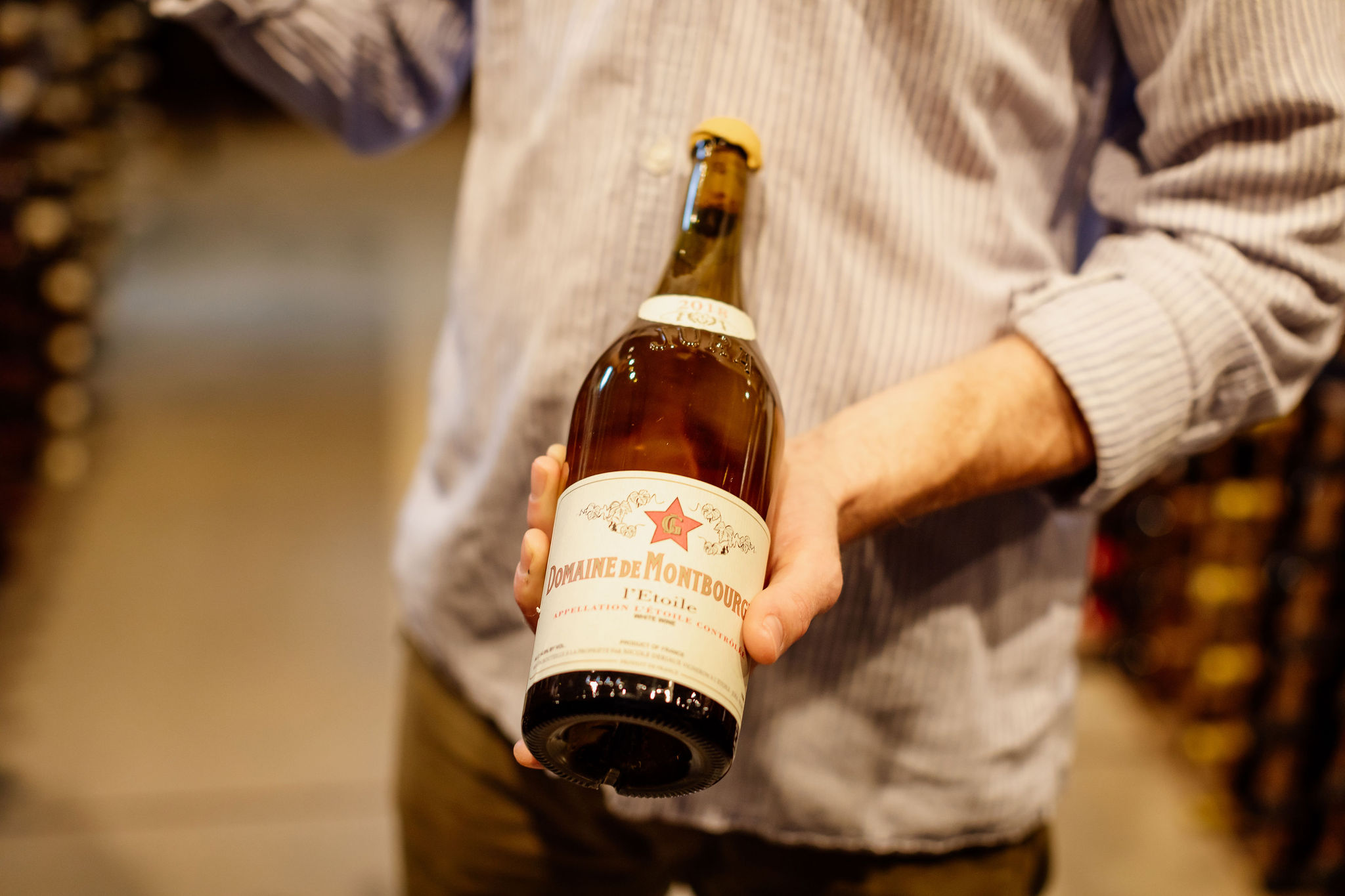
That's when his world changed.
Let's rewind. In the early 1900s, a family of Kneips immigrated from Czechoslovakia and Germany to Round Top, Texas, and began cattle-farming.
"You pronounce the 'K'," he said. "It actually translates to 'pub'."
A century, Caleb and his wife were living in SoCal when COVID hit. They, too, become migrants of a different kind: fleeing California, they moved to a family farm in Arkansas. They welcome their first daughter - home-birthed, she shares the same birthday as both Caleb and his wife - then they all moved to Signal Mountain where Caleb's dad had retired.
"I went to UC-San Diego for theater," he said, "but wine got me instead."

He brought to Chattanooga a decade of industry experience: lead bartending, menu creation, training and a dog-eared copy of Aldo Sohm's "Wine Simple."
"He was an Austrian sommelier," he said. "It completely captivated me. Reading about wine? I couldn't stop."

Soon, he became The Dwell Hotel's lead bartender, then, moved to a new restaurant to help build its wine program.
"I was a server, assistant manager over the wine menu, bartending, guiding the wine and training," he said.
Then, some changes within the restaurant.
"And all that momentum stopped," said Caleb.
Awaiting the birth of their second daughter, he'd gone to Imbibe for a few bottles.
I was right here. I bought this bottle.
Marc Denis, Imbibe's general manager, had known Caleb by presence - a frequent and inquisitive customer - and by reputation. Like that French father, Marc, too, had a hunch. Maybe, just maybe ...
"He was waiting for me by the door," Caleb said.
We're looking for a new wine director, Marc told Caleb. I think you'd be perfect.
An interview later: it's all green lights for me, Caleb told Marc. I'm ready.
"I wasn't even looking. It just happened organically and serendipitously. I'm a believer, so there was a God part to this," Caleb said.
He took the job in July. Two days after his training began, his second daughter was born.
"It's an amazing job," he said. "Very humbling. It's a gift."

So, the amateur-chef-theater-major-wine-expert-Christian-husband-father whose Czech-German last name means "pub" also calls himself "a bookworm."
He can talk - none of it stuffy, all of it welcoming and inspiring - about the reasons for corks, tin foil around champagne necks and sulfites in French fries. Why wine is aged facing downward. Why bottles can explode. Which bottles come from genuine growers. Which don't.
"The product is made by a farmer, not somebody in a tuxedo," he said. "It’s made by somebody who gets their hands dirty with cuts and bruises out on the land."
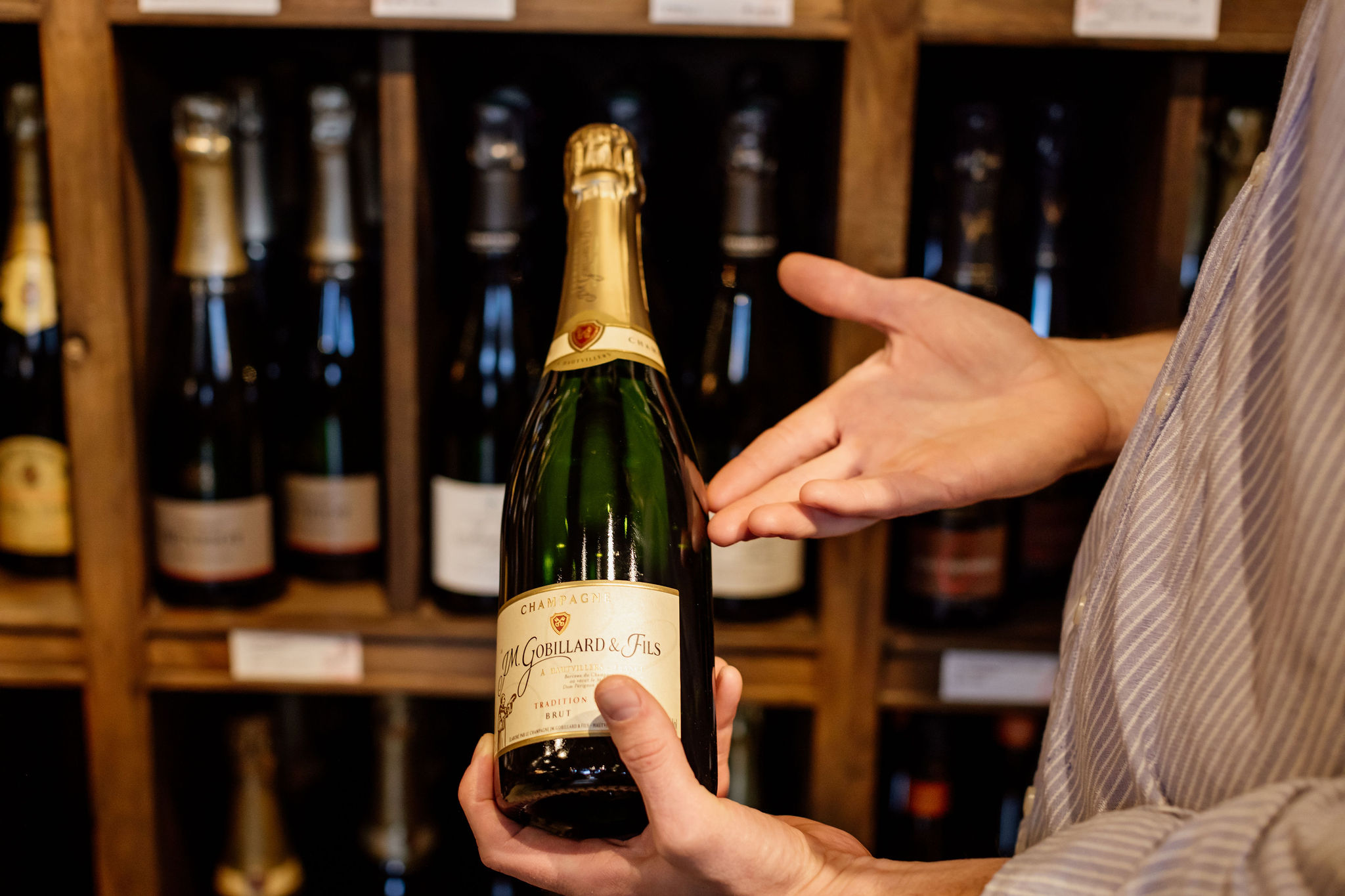
There are two ways to shop for a bottle of wine.
We can rush and forget.
Or we can remember and listen - for sheep and stars and hunches and fathers and daughters saying yes to their dreams.
"That's what I love about wine," Caleb said.

Epilogue: Tips for a Dry January
Here's a story more Americans are telling themselves.
We can live with less alcohol.
A coast-to-coast rise in sobriety - or at least dabbling with it - has sprung. Dry January. Damp January. Sober October. Mocktails. The pendulum's swinging back after the it's-five-o'clock-somewhere pandemic.

We walk back to the non-alcoholic shelves at Imbibe. Not that long ago, this would have consisted of, well, a dusty six-pack of O'Doul's.
Now?

The shelves are heavy with n/a wines, spirits and beers, including the current king.
Athletic Beer.
"The hottest beer in America doesn't have alcohol," declared the Wall Street Journal.
The WSJ reports that Whole Foods Market sells more Athletic than regular beer. Patagonia's selling n/a beer. In the center of Imbibe's shelves, yes, a six-pack of O'Doul's, the only option many of us remember way-back-when.
"They were way ahead of the curve," said Caleb.
"The OG," Sarah said.
"It tasted horrible," I added.
But now? Last summer, I tasted an Untitled Art one evening at Alleia, then an Athletic. Whoa.
Most nights, I drink an Athletic and would gladly put down $50 on a taste-test; pour any beer you want, and blindfolded, you'll swear an Athletic tastes just as good.
But, if you're sober curious, Caleb has a few suggestions:
- St. Agrestis's Phony Negrony.
"They are tasty. I’ve had many of these and been fooled."

- Proxies.
"Proxies use pinot noir grapes; the one I recommended - Gold Crush - does not use wine grapes."
Other Proxies - and other n/a wines - use wine grapes, but remove the alcohol.
"They are cool, like high-end teas in a wine bottle," he said. "They use pinot noir grapes that's more like a tea."
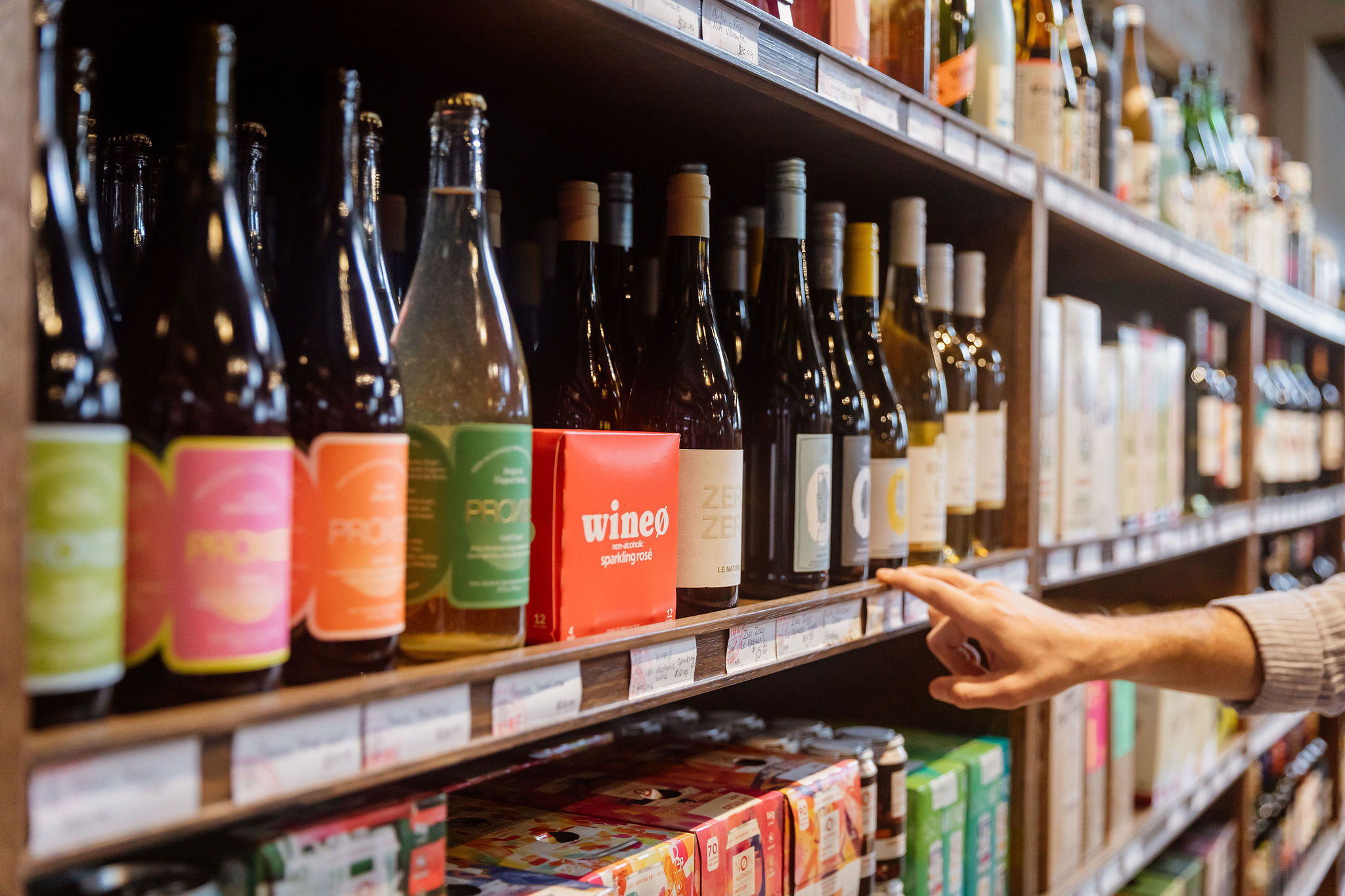
- Liquor is the most difficult to mimic. Then, wine. Then, beer.
"Beer is low-alcohol," he said. "You only have to remove five percent of the product and finagle five percent of something back in.
"Spirits? Good luck. You're talking about 40 percent of a product. You're removing about half."
For wine drinkers, it's better to choose drier options.
"For people that like a long finish - like a cab or malbec - then you're missing the sugar that helps that. You're not getting it," he said.
He reached for a Lietz Eins Zwei Zero pinot noir.

"I grabbed this for us," he said. "In 1907, Johannes Leitz was given the patent for the vacuum process that removes alcohol from wine."
We walk into Imbibe's back room where bottles are selling for three and four figures. He points to one, high on the shelf.
Take a guess.
$1200?
"Higher."
$1700?
"That's a $2100 bottle," he said.
A secret doorway opens us up to Imbibe's tasting room. Caleb's thoughtfully set the table: an open bottle, three glasses, the Aldo Sohm book that launched it all for him.

"Sniff all around and smell it," he said. "I smell some mushroom, some leather, a little bit of cherry."
We sip. I hold my tongue.
"You still get the acidity and freshness and fruit integrated there," he said. "If I wanted to get pretty darn close to a pinot noir, this is it."
Honestly, it tasted like the finest grape juice I've ever had ... but not wine. Kinda like it was missing the best part.
Then again, as we stood there with an open bottle, three glasses, among friends, with an ease and lightheartedness and stories in the air, maybe the best part wasn't missing at all.
"Wine bridges cultures," Caleb said. "It bridges generations. It brings people together."

Story ideas, questions, feedback? Interested in partnering with us? Email: david@foodasaverb.com
This story is 100% human generated; no AI chatbot was used in the creation of this content.
food as a verb thanks our sustaining partner:
food as a verb thanks our story sponsor:
Society of Work

With a Dry January epilogue
There are two ways to enter a wine + spirits store on New Year's Eve.
You can beat a straight-line path to the first $20 bottle in reach, grab it, swipe - your card, not the bottle - and go.
The other way?
Let the bottle find you.

But how?
"Place," said Caleb Kneip, wine director at Imbibe Chattanooga. "And story.

Stories come easily to Caleb, who oversees Imbibe's wine collection and its Wine Club, the largest in the region.
Stories like this one.
"Ruppert-Leroy," he said, as we stood near shelves of Champagne.
"It's a father and daughter," Caleb began. "They only farm 15 acres of vines. They don't buy any fruit. They grow it themselves and make the Champagne themselves."

Years ago, Benedicte Leroy was preparing to leave home for college. Her father, Gerard Ruppert, had an ache, a wish, a hunch that maybe ... just maybe ...
Would you like to stay here instead? he asks. We could make wine together.
Yes! she says.
"She dropped everything else," Caleb said. "Ruppert and Leroy are their last names. They only export 2000 cases a year."
There are 1600 bottles inside Imbibe, the Broad St. wine + spirits store opened 10 years ago by local restaurateur Josh Carter.

Every bottle comes from somewhere. A place.
They all carry a story.
Cue: Caleb. He's the tour guide, ushering us to a new relationship with wine as a drinkable experience - part-place, part-emotion, part-living story - so we begin shopping for more than taste alone.
"A lot of it comes down to story," he said. "What story grabs you?"

Let the bottle find you? Please. Hells bells, we're all so rushed. I get it.
But quite possibly, we're rushing by the best part of the wine.
It's like visiting a museum with your eyes shut.
"It can communicate so much more than what is being poured into your glass," said Caleb, 30.
Caleb reaches for a bottle of Lunaria Ancestrale from Italy.
"Have you ever had a bubbly pinot grigio the color of grapefruit juice?" he asked.

There's a tiny piece of string attached.

"They have sheep that run through the vineyard," he said.
The biodynamic vineyard sees itself as extension of the larger ecosystem; the sheep's presence makes the vineyard more fertile, which makes the wine more pleasurable.
When you drink this, thank the sheep. The little wool string is a tangible reminder, a nod for all these other parts of life involved.
"For all the other stuff beneath the grapes, what's giving life to the grapes," he said. "That's what is being picked."
He points up higher - the top shelf of Champagne.
You better believe there's a story there.

The story goes that a Benedictine monk in 17th-century France devoted his life to improving fermented wine. One particular day, he got it particularly right.
"Come quickly!" he shouted. "I'm tasting the stars!"
His name?
A young Dom Perignon.
When you pop open a bottle of Perignon, you're now connected to that young monk.
Story? Yes. Place? Absolutely.
And stars.
"Now, you've added romance," said Caleb.
(A reminder: Champagne refers to a region in France. All Champagne must come from Champagne, which sounds existential, but is really a statement of geography.)
Can't afford true Champagne? Caleb walks us a shelf over where brilliant vintners are making bubbly in other parts of the world.
"Raventos i Blanc," he said. "I would put this wine up against any of the group. Now, it is not Champagne, but you're getting high quality bubbles made in the same way."

Some 350 years after a young Dom began "tasting the stars," Caleb began tasting his way through Imbibe's collection; he began as wine director in August. He also oversees Imbibe's monthly wine club, with 140 members.
"We're the biggest wine club in the Southeast," he said.
Fortunate lot, those Imbibe wine clubbers. Caleb is as a much inviting storyteller as wine director.
You better believe he's got one to tell.
"I was right here," he said. "I had just picked up this bottle."

That's when his world changed.
Let's rewind. In the early 1900s, a family of Kneips immigrated from Czechoslovakia and Germany to Round Top, Texas, and began cattle-farming.
"You pronounce the 'K'," he said. "It actually translates to 'pub'."
A century, Caleb and his wife were living in SoCal when COVID hit. They, too, become migrants of a different kind: fleeing California, they moved to a family farm in Arkansas. They welcome their first daughter - home-birthed, she shares the same birthday as both Caleb and his wife - then they all moved to Signal Mountain where Caleb's dad had retired.
"I went to UC-San Diego for theater," he said, "but wine got me instead."

He brought to Chattanooga a decade of industry experience: lead bartending, menu creation, training and a dog-eared copy of Aldo Sohm's "Wine Simple."
"He was an Austrian sommelier," he said. "It completely captivated me. Reading about wine? I couldn't stop."

Soon, he became The Dwell Hotel's lead bartender, then, moved to a new restaurant to help build its wine program.
"I was a server, assistant manager over the wine menu, bartending, guiding the wine and training," he said.
Then, some changes within the restaurant.
"And all that momentum stopped," said Caleb.
Awaiting the birth of their second daughter, he'd gone to Imbibe for a few bottles.
I was right here. I bought this bottle.
Marc Denis, Imbibe's general manager, had known Caleb by presence - a frequent and inquisitive customer - and by reputation. Like that French father, Marc, too, had a hunch. Maybe, just maybe ...
"He was waiting for me by the door," Caleb said.
We're looking for a new wine director, Marc told Caleb. I think you'd be perfect.
An interview later: it's all green lights for me, Caleb told Marc. I'm ready.
"I wasn't even looking. It just happened organically and serendipitously. I'm a believer, so there was a God part to this," Caleb said.
He took the job in July. Two days after his training began, his second daughter was born.
"It's an amazing job," he said. "Very humbling. It's a gift."

So, the amateur-chef-theater-major-wine-expert-Christian-husband-father whose Czech-German last name means "pub" also calls himself "a bookworm."
He can talk - none of it stuffy, all of it welcoming and inspiring - about the reasons for corks, tin foil around champagne necks and sulfites in French fries. Why wine is aged facing downward. Why bottles can explode. Which bottles come from genuine growers. Which don't.
"The product is made by a farmer, not somebody in a tuxedo," he said. "It’s made by somebody who gets their hands dirty with cuts and bruises out on the land."

There are two ways to shop for a bottle of wine.
We can rush and forget.
Or we can remember and listen - for sheep and stars and hunches and fathers and daughters saying yes to their dreams.
"That's what I love about wine," Caleb said.

Epilogue: Tips for a Dry January
Here's a story more Americans are telling themselves.
We can live with less alcohol.
A coast-to-coast rise in sobriety - or at least dabbling with it - has sprung. Dry January. Damp January. Sober October. Mocktails. The pendulum's swinging back after the it's-five-o'clock-somewhere pandemic.

We walk back to the non-alcoholic shelves at Imbibe. Not that long ago, this would have consisted of, well, a dusty six-pack of O'Doul's.
Now?

The shelves are heavy with n/a wines, spirits and beers, including the current king.
Athletic Beer.
"The hottest beer in America doesn't have alcohol," declared the Wall Street Journal.
The WSJ reports that Whole Foods Market sells more Athletic than regular beer. Patagonia's selling n/a beer. In the center of Imbibe's shelves, yes, a six-pack of O'Doul's, the only option many of us remember way-back-when.
"They were way ahead of the curve," said Caleb.
"The OG," Sarah said.
"It tasted horrible," I added.
But now? Last summer, I tasted an Untitled Art one evening at Alleia, then an Athletic. Whoa.
Most nights, I drink an Athletic and would gladly put down $50 on a taste-test; pour any beer you want, and blindfolded, you'll swear an Athletic tastes just as good.
But, if you're sober curious, Caleb has a few suggestions:
- St. Agrestis's Phony Negrony.
"They are tasty. I’ve had many of these and been fooled."

- Proxies.
"Proxies use pinot noir grapes; the one I recommended - Gold Crush - does not use wine grapes."
Other Proxies - and other n/a wines - use wine grapes, but remove the alcohol.
"They are cool, like high-end teas in a wine bottle," he said. "They use pinot noir grapes that's more like a tea."

- Liquor is the most difficult to mimic. Then, wine. Then, beer.
"Beer is low-alcohol," he said. "You only have to remove five percent of the product and finagle five percent of something back in.
"Spirits? Good luck. You're talking about 40 percent of a product. You're removing about half."
For wine drinkers, it's better to choose drier options.
"For people that like a long finish - like a cab or malbec - then you're missing the sugar that helps that. You're not getting it," he said.
He reached for a Lietz Eins Zwei Zero pinot noir.

"I grabbed this for us," he said. "In 1907, Johannes Leitz was given the patent for the vacuum process that removes alcohol from wine."
We walk into Imbibe's back room where bottles are selling for three and four figures. He points to one, high on the shelf.
Take a guess.
$1200?
"Higher."
$1700?
"That's a $2100 bottle," he said.
A secret doorway opens us up to Imbibe's tasting room. Caleb's thoughtfully set the table: an open bottle, three glasses, the Aldo Sohm book that launched it all for him.

"Sniff all around and smell it," he said. "I smell some mushroom, some leather, a little bit of cherry."
We sip. I hold my tongue.
"You still get the acidity and freshness and fruit integrated there," he said. "If I wanted to get pretty darn close to a pinot noir, this is it."
Honestly, it tasted like the finest grape juice I've ever had ... but not wine. Kinda like it was missing the best part.
Then again, as we stood there with an open bottle, three glasses, among friends, with an ease and lightheartedness and stories in the air, maybe the best part wasn't missing at all.
"Wine bridges cultures," Caleb said. "It bridges generations. It brings people together."

Story ideas, questions, feedback? Interested in partnering with us? Email: david@foodasaverb.com
This story is 100% human generated; no AI chatbot was used in the creation of this content.


